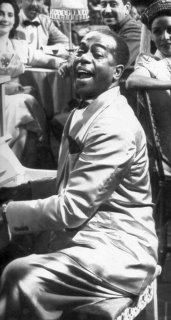
What is often overlooked in most historical recanting of 'As Time Goes By' enduring success is the instantly recognizable vocal rendition by Dooley Wilson. Born Arthur Wilson, the black actor had first made his splash as ‘Little Joe’ in the Broadway version of Cabin in the Sky. Initially, Hal Wallis had toyed with the idea of recasting the character of Sam as a woman. At various intervals Lena Horne, Hazel Scott and Ella Fitzgerald were considered for the part. Eventually, it was decided to keep Murray Burnett’s characterization of Sam status quo, allowing Dooley Wilson to create one of the most memorable and ground-breaking film performances for a black actor of this vintage.
In an age where dim-witted mammies, infrequently visible maids, or blindly loyal butlers populated the cinema landscape and remained the cloistered norm for African American actors on the big screen, Dooley Wilson’s Sam is a revisionist take that expands these limited boundaries. It is, for example, Sam who defies Ilsa Lund upon her reappearance at Rick’s Café Americain: “Leave him alone, Miss Ilsa. You bad luck to him.”
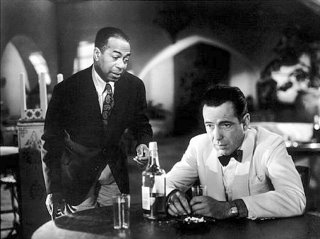
It is Sam who confronts Rick’s bitter insolence during one night of drunken pity with a bit of his own.
Sam: You going to bed?
Rick: No.
Sam: Ain’t you never going to bed?
Rick: No!
Sam: Then I ain’t sleepy neither!
And, it is Sam who manages in the final moments of the Paris flashback to convince Rick to save himself from being captured by the Nazis by forcibly placing them both on the last train leaving the city.
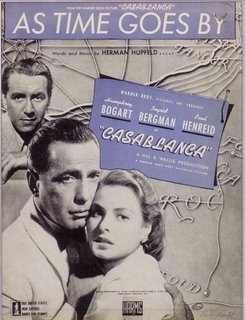
Throughout the shoot, cast and crew alike shared their concerns that no suitable ending to the film existed. As principle photography moved toward the climactic moment this concern grew to near hysteria. At one point, Ingrid Bergman made daily trips to the Epstein’s office to inquire about the finale. She was politely told, “when we know, you’ll know.”
Indeed, the Epstein’s did not know what to make of the last act of Casablanca until, in a moment of mutual inspiration, they conceived the finale in which Rick renounces his romantic claim on Ilsa and sends her to America on the arm of husband, Victor. Julius Epstein would later recall, “We both turned to one another and simultaneously said, ‘Round up the usual suspects’.”
This ending to Casablanca is one of the most prolific and inspired in cinema history. In short order it adequately
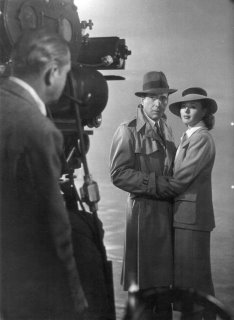 resolves the lover’s triangle with a morality message, in effect saying that there are human essentials and ideals worth making sacrifices for. The rejection of Ilsa by Rick is in keeping with Rick’s stoic and noble stance on life, and, Ilsa’s acceptance suggests that her love for Victor has always been stronger than the romance shared with Rick.
resolves the lover’s triangle with a morality message, in effect saying that there are human essentials and ideals worth making sacrifices for. The rejection of Ilsa by Rick is in keeping with Rick’s stoic and noble stance on life, and, Ilsa’s acceptance suggests that her love for Victor has always been stronger than the romance shared with Rick.The finale also asserts Rick’s nobility as a freedom fighter that has only been hinted at in minor dialogue about his blockade running. Rick’s assassination of Major Heinrich Strasser and its cover-up by Capt. Renault ideally caps off the suspense and action – reconciling Rick and Louie’s playfully adversarial relationship with “Louie, this looks like the beginning of a beautiful friendship.”
The line – memorable and emblematic in the history of American films, was reportedly penned by Hal Wallis and inserted into the finished film a month after the final edit had already been made.
Interoffice memos of the period suggest that at one point Wallis briefly contemplated the idea of recalling the cast to shoot an epilogue featuring Rick and Louie aboard an Allied destroyer. However, for various reasons – not the least of which was Ingrid Bergman being unavailable for retakes, this tack-on ending was never filmed.
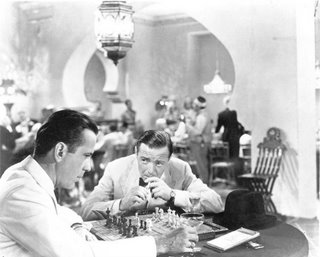
Casablanca debuted on November 26, 1942 at New York’s Hollywood Theater as part of an honorary engagement for the Free French. Its Los Angeles premiere on January 23, 1943 officially launched Casablanca’s general syndication. The film, at once timely and timeless, was an immediate sensation, prompting Warner publicity to suggest that a sequel might be in order. However, those plans were quashed by David O. Selznick. Fancying himself the custodian of Ingrid Bergman’s immense popularity, Selznick did not see any reason why one of America’s top talents should appear in a ‘sequel’ to anything.
Perhaps, owing to the fact that all truly great art is multifaceted, the prospect of accurately rating any artifact based on its artistic integrity seems moot at best. Despite what must have seemed like insurmountable difficulties on the set throughout the shoot, Casablanca’s afterlife since has proven just as prolific and enthralling as the film itself.
In 1955 the American Broadcast Corporation (ABC) premiered its own version of Casablanca; a flashy exercise in 50s iconography set in the then present. But the magic of the original eluded the TV series. It lasted only one season.
In 1977, the American Film Institute listed Casablanca as its #3 choice of all time great films, after Gone With The Wind and Citizen Kane, but a British poll from 1983 placed Casablanca at #1. That same year, Warner television took another stab at transcending the film’s popularity as a series. Again, the intangible excitement that permeated the film was totally absent from the series.
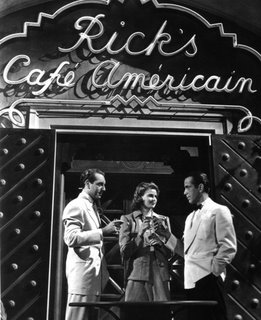
In 1988, media mogul and heir apparent to the bulk of the Warner/MGM and RKO film libraries; Ted Turner infuriated film purists and most of Hollywood with his debut of a colorized Casablanca on his cable network. Despite the outrage, home video sales were favorable and copies of Casablanca in color can still be found in bargain bins and on the internet for resale. But perhaps Casablanca’s most notable achievement of the decade was its 1989 acquisition into the National Film Registry as one of the original 25 motion pictures identified for restoration and preservation for all time.
Time has indeed gone by. But the incandescent appeal of Casablanca remains eternal, and, as time continues to go by, everybody comes back to Rick’s – for nostalgia, and for the intangible longings inherent in the perennial romantic in all of us. Sam…play it again.
@2006 (all rights reserved).
No comments:
Post a Comment